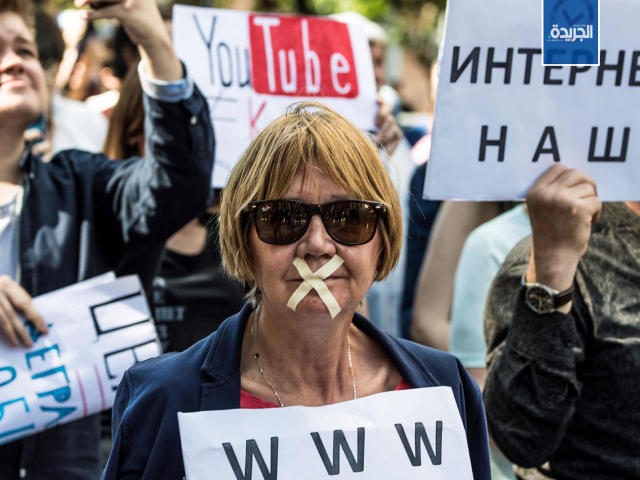A modest demonstration for Internet freedom was held in Moscow on Sunday, pushing back against a crackdown on free speech in advance of the next presidential election.
Estimates of the crowd size range from “hundreds” (Radio Free Europe) to “more than 2,000” (Australia’s ABC News). Suffice to say that the streets of Moscow were not flooded with demonstrators, but there were enough of them to gain some attention.
The protesters were upset by Russian government intrusion into the Internet, which until now has been one of the few avenues for political dissidents to speak freely and attract sizable audiences. As ABC notes, Vladimir Putin’s upstart adversary Alexei Navalny has 1.3 million YouTube followers, even though he does not poll terribly well against Putin.
Putin’s government apparatus seems worried that an unexpected strong youth movement will burst forth around Navalny and similar candidates, so measures are being taken against everything the kids like, from fidget spinners to websites.
“With presidential elections due in just eight months, the Kremlin is playing catch-up, introducing a flurry of new laws designed to bring the online space under its control,” ABC reports. Those measures include a blacklist imposed by the Russian Federation’s media watchdog Roskomnadzor, requiring Internet providers to supply the government with six-month records of any given user’s activity, and mandating back-door encryption keys so government agents can monitor all online conversations.
The demonstrators brandished slogans such as “No to censorship, no to dictatorship,” “Down with the police state,” “Truth is stronger than censorship,” and “Free country, free Internet.” In addition to overturning the most onerous recent censorship measures, they are demanding the firing of Aleksandr Zharov, who heads up the Roskomnadzor censorship agency.
Radio Free Europe quotes Sarkis Darbinyan of the Moscow-based Center for the Defense of Civil Rights strongly objecting to legislation that would effectively outlaw Internet proxy services and anonymous mobile messaging, wiping out the last vestiges of online privacy in Russia. He said Russian Internet users are “tired of the volume of crazy laws” thrown at them.
Reporters Without Borders called the latest round of censorship measures “the last nails into the coffin of Internet freedom in Russia,” and offensive to both the Russian Constitution and the European Convention on Human Rights.
The demonstration seems to have been quite orderly, with proper permission secured in advance from the relevant authorities. There were only three arrests, one of them involving the distribution of leaflets promoting Aleksei Navalny.
Deutsche Welle reports the protesters also demanded “the exoneration of Russians prosecuted for posting content online,” specifically highlighting the case of blogger Ruslan Sokolovsky, who was jailed for uploading a video of himself playing Pokemon Go in a Russian Orthodox church.
Another name put forward by the demonstrators was Dmitry Bogatov, a math teacher who arrested for allegedly “making public calls for terrorist activity,” one of which was a Kanye West music video. There is considerable evidence Bogatov did not create the posts in question. When a judge seemed on the verge of letting him go, the government slapped on heavier charges of inciting terrorism to keep the case alive.
Deutsche Welle notes that “Russia has become the world leader in the number of requests for the removal of information from Google’s search results and other company services, in particular from YouTube.” The measures protested in Moscow on Sunday would eliminate some of the last few techniques available to Russians to circumvent censorship and participate in the global Internet.
It seems clear that worldwide providers are not going to launch a resistance movement against the censorship demands of authoritarian governments like Russia and China; on the contrary, viral authoritarianism is seeping into the rest of the world, as even nominally free countries begin drawing up their own lists of banned websites and forbidden terms. Russians who care about free speech are wise to conclude that the rest of the world will not be riding to its rescue in Moscow.

COMMENTS
Please let us know if you're having issues with commenting.